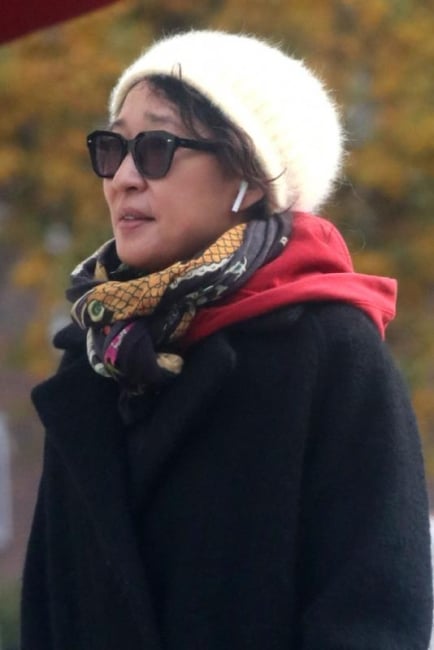You have /5 articles left.
Sign up for a free account or log in.

Sandra Oh
Neil Mockford/GC images/getty images
Amazingly, market research has identified a sector of the general population, at least a subset of Netflix subscribers, eager for a six-episode series about the day-to-day life of someone like me, chair of a university’s English department. The trailer of The Chair, which debuts tomorrow, Aug. 20, follows Ji-Yoon Kim (played by Sandra Oh) in her new role as the chair of the English department at the prestigious Pembroke University.
As a “lady chair,” I appreciate the writers’ optimizing the comic potential of navigating gendered expectations of authority. Confronting barely concealed bias, all in a day’s work for faculty of color in leadership positions, one plot trajectory charts Oh’s character coming into her own. A female colleague schools her, “You should be running this place; instead, you are running around playing nice.” Yet later, when a male faculty member indignantly accuses her of “act[ing] like you are my boss,” Kim replies, “I am your boss!”
The hook of this dark comedy, however, is more in line with shows like ER than Nurse Jackie. The climax of the trailer is the dire proclamation: “This department is hanging on by a thread!” The creators of The Chair are banking that we, the viewing audience, are invested in the department not going under, and, I assume, that characters representing the faculty, university administrators and members of the board care as well. At the same time, the show promotes itself as satire, which would seem to undercut the earnestness of its depiction of a department under duress and our collective investment in the department’s survival and Kim’s maturation as a leader at a time of crisis.
The choice of satire raises a question: What is the best genre for depicting the role of the chair at a moment when so many English departments are, as the show would have it, “hanging on by a thread”? A colleague who watched the trailer commented, “They just don’t get it” -- “it” being higher education leadership in the humanities. I had to stop myself from responding, “Do we get it?”
Reimagining, Re-Envisioning and Reinventing
The role of department chair has always been demanding and never more so than in the past few years. This period has been marked by the chair’s expanding scope of administrative responsibilities in areas of department governance and office management; instructional oversight; curriculum development and programming; personnel matters; public relations, outreach and develop; strategic communications; financial, facilities and data management; and compliance with ever-changing campus, university system, state and federal policies, procedures, guidelines and expectations.
At the Big Ten, R-1, flagship state university where I teach, English is one of the largest and most complex departments -- home to seven academic programs and three centers, nationally ranked master’s and Ph.D. programs, and academic writing and professional writing programs that serve more than 15,000 undergraduates annually. Despite my title of chief academic officer -- although internally I am referred to as the unit head -- and a portfolio that currently boasts 46 bullet points, I often experience my job as different in kind but not degree from that of the proverbial day manager who sheepishly hounds people to clean behind the steam table. Yet in the eyes of the institution that tags my duties with verbs such as “direct,” “oversee,” supervise,” “enforce” and “optimize,” the increasingly professionalized role of department chair ensures that the trains run on time.
Over the past 15 months -- during which we have been pummeled by an ongoing global pandemic; relentless, sweeping racial injustice; and increasing political polarization -- leadership challenges have not only intensified but the entire premise of the chair has also been upended. At a moment at which the wheels seem to have come off bus, Oh’s character sits at the head of a conference table and boldly proclaims a sentence that has often run through my head and I suspect those of my counterparts over the past year: “I am the chair of the department -- let’s fucking shake this place up.”
Indeed, on the ground, the most important work in which I have been engaged is not represented by the 46-item bulleted list describing my duties but is the work of reparative change. Reimagining, re-envisioning and reinventing have been my most salient contributions over the past year. This includes the shift to remote teaching and learning that called for an entire reframing of the enterprise; a realignment of principles and values that necessitated revising department policies, procedures and practices to ensure a diverse and inclusive climate; the generation of innovative approaches to budget management and resource allocation; the wholesale rethinking of the place of compassion and equity in assisting students, faculty and staff with physical and mental health challenges; and the revamping of degree programs and curriculum in light of an evolving landscape of higher education pivoting toward public-facing initiatives, increased access and collaborative learning.
A recent study based on the survey of 172 department chairs across the United States published in March 2021 offers comprehensive findings on the impact of COVID on the role of chair. Not surprisingly, demonstrable so-called crisis leadership, which once occupied the periphery of the position, is now one of its expected competencies.
Forged in the crucible of the perpetual “crisis of the humanities,” crisis leadership has always been in my wheelhouse. In this respect, the perspectives and competencies endowed by my training as a humanist have specifically prepared me for the role I occupy today. I am not a disciplinary chauvinist. I take as axiomatic that all academic disciplines, programs and fields help us to better understand the human condition and, in so doing, prepare students to make the world a better place. Empathy, collaboration, critical thinking, efficacious communication, engaged pedagogies and inter- and cross-disciplinarity perspectives are not the sole province of the humanities. However, the position of chair has benefited from my distinctly humanistic orientation toward what I would describe broadly as repair.
An Inflection Point
Academic leaders in the humanities are at an inflection point as we confront what it means to resist the impulse to save a given entity -- a department, a college or an institution -- and instead dedicate our energies to transforming it. Cross-disciplinary and multidisciplinary scholars, activists and activist-scholars within and beyond the academy have already launched initiatives, centers, institutes, collaborative projects and social and intellectual programming exploring reparation in light of the historical, social, psychological, economic and political consequences of slavery, racial injustice and structural inequities.
This past year, chairing an English department was an object lesson in creating just communities. My role required inspiring collective adaptation. Sometimes this entailed establishing metrics for communal accountability; other times, it has meant providing opportunities for shared sacrifice of certain privileges. In particular instances, material reparations to the most precarious were prioritized. At another moment, I facilitated a broad-based reorientation of values and rewards by generating new opportunities for recognition and advancement. Throughout the year, I led us through a process of communal reflection and, when necessary, reckoning.
For as long as I can remember, I have served as an ambassador of a field reputably “hanging on by a thread,” and so by necessity I have had to demonstrate agility and creativity in response to the dire, insight into systemic sclerosis and learned optimism in face of urgency. So, yes, this is the moment of The Chair, but, more importantly, of the chair of English who has steadily and quietly advanced a principled, vibrant, inclusive, forward-looking humanities, while bringing people along to engage in the work of transformation at the most difficult of times.
Professors of English have long been committed to reinvention, and our staying power attests to our ability to reimagine and renew the discipline with an eye toward attracting ever more diverse audiences, promoting emergent approaches, connecting with various publics and generating new subfields. The new Netflix series The Chair is an opportunity -- a missed one, I suspect -- not only to show the humanities to be a site of imaginative and humane reinvention, but also to communicate how chairs are currently engaged in some of the most visionary work in the history of higher education. In the upcoming months, chairs all over the country will be saying to themselves and maybe even out loud to their constituents, “I am the chair of the department -- let’s fucking shake this place up,” and, in doing so, realizing the humanities as ripe for collective repair.
So what is the right genre for The Chair? The announcement of budget cuts and hiring freezes conveyed by senior administrators in dulcet tones cries out for noir. The rejection of the target hire you have spent months cultivating and expending political capital over is clearly the stuff of 1980s rom-com. But I am thinking about the standard Discovery Channel fare that puts us on the edge of our seats as we watch the dolphin with an injured tail recalibrate her relationship to the natural environment or a caterpillar emerge from her chrysalis, resplendent.




